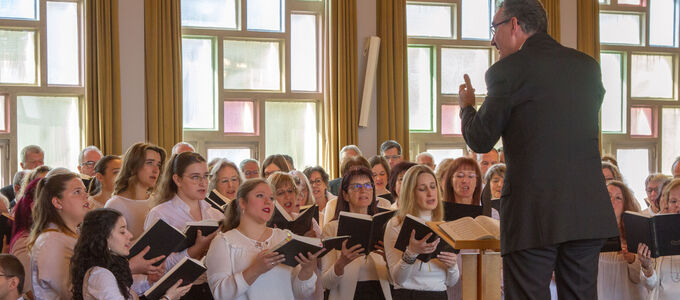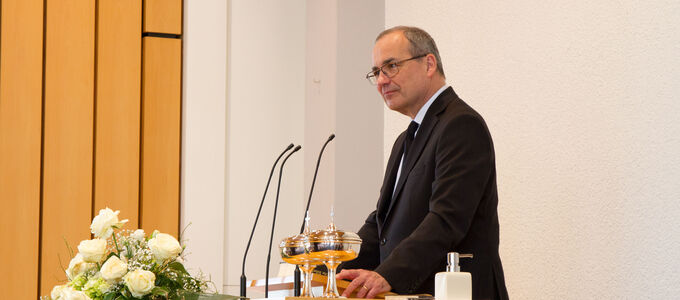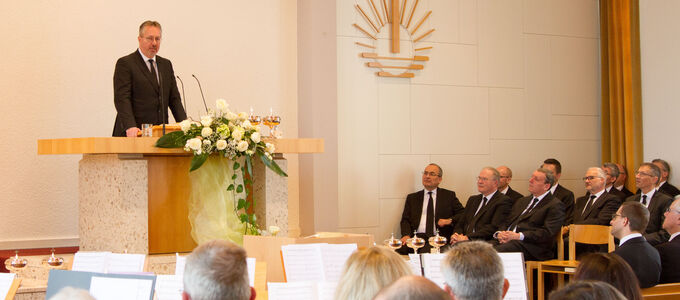
In the last hours before His death, Jesus repeatedly sought a connection to His Father. In his sermon on Good Friday, the Chief Apostle explained what these prayers entailed and how we should use them as a guide to give direction to our lives today.
On 29 March 2024, Chief Apostle Jean-Luc Schneider conducted a divine service in the congregation of Wil in Switzerland. He based his sermon on Mark 14: 35–36: “He went a little farther, and fell on the ground, and prayed that if it were possible, the hour might pass from Him. And He said, ‘Abba, Father, all things are possible for You. Take this cup away from Me; nevertheless, not what I will, but what You will.’”
The will of God
In order to align our own prayer with God’s will, we need to understand what this will entails. The Chief Apostle pointed out that Jesus knew the will of God and was also quite aware of His mission. “Jesus Christ was sent to break the power of evil and death. His mission was to defeat evil.”
His Father’s will was so important to Him that all of the devil’s efforts to separate Jesus from His Father failed. “Jesus Christ experienced evil in an extreme way, but neither evil nor death could separate Him from God. He remained without sin.” As Jesus was about to bring His sacrifice, He repeatedly sought a connection with His Father in prayer.
Jesus’ prayers in Gethsemane
The prayers in the Garden of Gethsemane show that Jesus was definitely afraid of suffering and death. “He knew that He would have to suffer a terrible death, and it was just as hard for Him as it would be for us. From this we can deduce how great and sublime His love and sacrifice are.”
In these difficult hours, Jesus spoke openly with His Father. He said something to this effect: “You can spare Me all of this and find another way to carry out Your will and do it in a completely different way. That is no problem for You. If You wanted to change something, it is not impossible for You. I trust in Your power, and I also trust in Your love and wisdom. You know more than I do. I trust in You because You love Me.”
This absolute trust and the awareness that God’s will was more important than anything else led Jesus to the conclusion: “Your will be done.”
Jesus’ prayers at Golgotha
Father, forgive them. “God wants to reveal His love. He wants to save sinners,” Chief Apostle Schneider pointed out. Even though people had done terrible things to Jesus, He knew: “I did not come to punish sinners, but to save them.”
My God, why have You forsaken Me? The relationship with God was the most important thing for Jesus, which is why He did not think about His pain and death at that moment. His greatest pain was the separation He felt from God.
Father, into Your hands I commit My spirit. “I entrust My life, My being to You. Do what You want. You are doing the right thing. I surrender to you completely.” Jesus’ trust in God was unshakeable and this gave Him the strength to fulfil His mission perfectly and to say, “It is finished,” at the moment of His death.
Praying in Jesus’ name today
The Chief Apostle went on to explain how the prayers of Jesus can inspire our own prayers.
“Only when you examine His person, His feelings, and His suffering so closely do you realise how great His love was. He would have had the opportunity to not go through with it right up to the end. But He did not do that. He wanted to fulfil His Father’s will because it was for your and my sake.” This awareness is reason to give thanks, the Chief Apostle said, “not necessarily with hallelujah songs, but with deep, lasting, and profound gratitude”.
Nowadays, people do not always choose a good way to express their dissatisfaction, the Chief Apostle said. However, it is anything but ridiculous to entrust oneself to God: “This is not a recipe for children but is on a very sublime level.” The Chief Apostle appealed to the congregation to seek an open dialogue with God. “The advantage is that you can tell Him fifty times a day and He won’t get tired of it. He will always listen to you. This intimate dialogue with God is something that must not go lost. We can tell God everything, even when we are not happy with Him.”
Let us conduct this open dialogue with the awareness that God is the Almighty. “If you are not satisfied with what is going on in your congregation, in the Church, in the world, let us remember how the Lord Jesus put it, ‘Father, all things are possible for You.’” This awareness can be strengthened by worshipping God in prayer, which leads to absolute trust. “We must all fight, but let us fight like Jesus Christ: I trust in God, His power, and His love.”
Once we understand God’s will properly we will also be able to pray like Christ: “Your will be done.. It is not God’s will that you are ill and in terrible pain. In fact, God wants to lead you to heaven, into fellowship with Himself.”
Those who make God’s will their own also know, “You have given me an assignment. I am supposed to share Your love and be a witness of Jesus Christ. And I am to be a blessing for my neighbour. I am supposed to reveal Your love and power and show people that I remain faithful to Jesus Christ despite my situation, and that the evil I am experiencing cannot separate me from God. I want to fulfil my mission. Your will be done. Give me the strength to do it.”
















